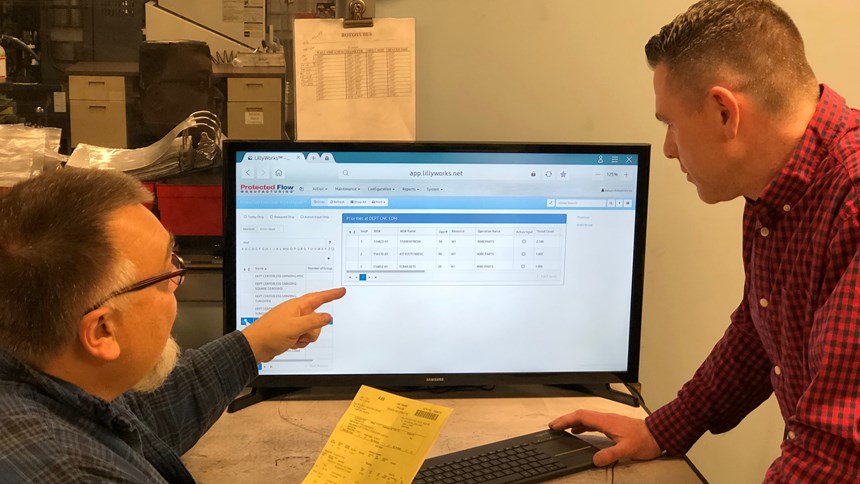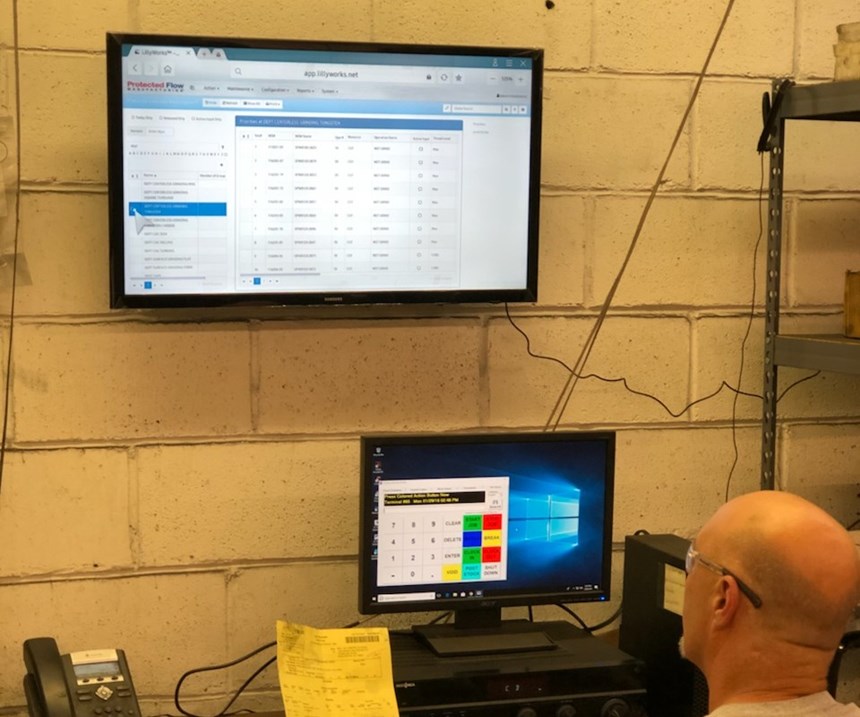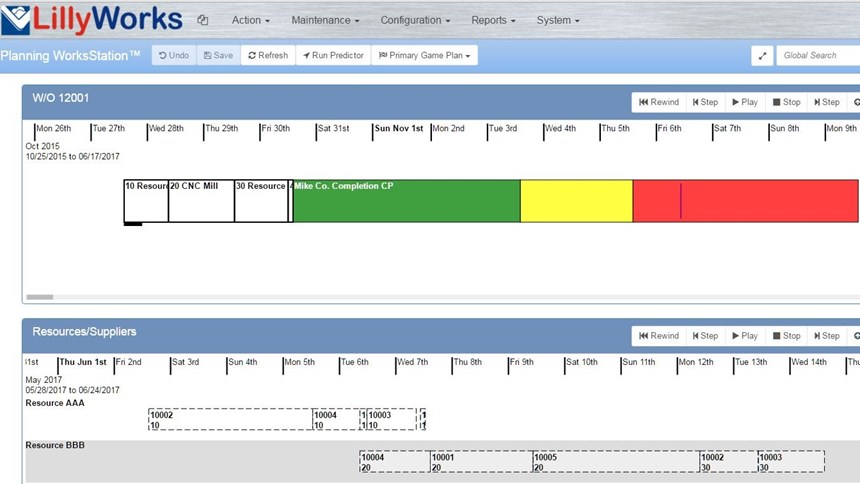Scheduling Software Helps Shop Protect Due Dates
Saturn Industries Inc., a shop that designs and fabricates EDM electrodes, was struggling with staying on time using its ERP system. LillyWorks’ Protected Flow Manufacturing scheduling software provided a solution to this challenge.
Over the last decade, some OEMs have experienced a paradigm shift in customer demand. At first, there was a demand for quality, but five years ago the focus shifted to price. In 2018, however, there’s been a shift yet again to expecting deliveries to be on time.
To keep these deliveries on time and to stay competitive, a company must find efficient scheduling software that takes minimal management and can automate the scheduling process. Unfortunately, shops that have been using the same scheduling software for years may not be reaching their deadlines for many reasons, ranging from order size to mismanagment of priorities.
Saturn Industries Inc. (Hudson, New York) is a shop that had been struggling with staying on time. It has been designing and fabricating EDM electrodes and tooling since 1959 and has been doing in-house job shop work geared toward milling, turning and producing micro-EDM units. But after using the same electronic resource planning (ERP) system since 2002, the evolving demands of the industry necessitated change.
According to Rory Lee, business development manager at Saturn, the former system was an all-in-one package that was unsuccessful multiple times in facilitating an effective schedule for the company.
“Every job is different,” Mr. Lee says. “The scheduling system that was being used would have worked great if we had a handful of parts that we were mass producing. But because we have a diverse portfolio of products and machining capabilities, it doesn't really gel.”
At the Eastec 2017 trade show, however, Saturn was provided a possible solution by LillyWorks Inc. (Hampton, New Hampshire). The software company’s Protected Flow Manufacturing (PFM) is a cloud-based scheduling software that bolts onto a shop’s ERP or production scheduling system and helps with on-time performance and flow problems. Designed specifically for small- and mid-sized manufacturers, it can be implemented with ERP systems such as Epicor, IQMS, SyteLine and M1.
While a typical ERP scheduling program sorts jobs based on due date, PFM focuses on order of execution. According to Mark Lilly, partner and co-owner of LW Performance, LillyWorks’ sales and marketing arm, “The software calculates when each operation of each job will start and finish based on resource capacity. It also estimates setup, run and move times, allowing users to control how and when to release jobs, which often leads to shorter lead times and much better on-time delivery performance.
“Every job gets a buffer percentage assigned to it,” Mr. Lilly says. “And once it’s released, the buffer starts getting eaten until it’s gone.” A task list is also created that automatically adjusts to real-time changes and gives predictions of future dangers and suggested actions, prevents premature work release and reduces time jobs spend waiting. It predicts when each job will arrive at a specific workcenter, monitors risk and simplifies the decision making.
“Any ERP user can struggle with the scheduling part of the software,” Mr. Lilly says. That was, in fact, the catalyst that spurred Saturn to look for a software with PFM’s capabilities. After the initial meeting, Saturn went live with the LillyWorks’ software in October 2017, within a week of the production execution window.
Flat-screen monitors installed throughout the shop provide live updates on jobs during the day that are deleted when completed and replaced by new orders. There is also the ability to see a job list—either next in queue or waiting for material to come in—wherever the part is in the building. Although one job will start in one area and finish in another, prior to implementing PFM, the department machining the last step wouldn’t realize that a job had already been started until it showed up ready to be worked on. Now there’s the ability to observe its progress from the start, so a department can prepare for its arrival.
The responsibility has also been shifted to operators on the floor rather than department foreman. In the past, scheduling involved spreadsheets and staff meetings to negotiate priorities. These inefficient practices led to late in-house orders. “We were going to miss a delivery and our commitment to the customer,” Mr. Lee says. “With the new paperless system, as orders are entered from the customer service department, they show up on the screen. Everything is put into a prioritized list that informs an operator of the amount of time a job is going to take and then can be sorted by length of time to completion.”
Saturn Industries consequently saw improvement within the first two months of switching to PFM. “At the time of launch,” Mr. Lee says, “in one of the first departments we implemented PFM, 51 percent of the work in that area was late or due that day. In spite of an increase in new orders that same department was able to cut the late backlog from 51 percent to 17 percent within the first two months of using the program.”
Often companies can be intimidated by disruptions brought on by new technology. “But the proof,” Mr. Lee says, “has been in the success of the program in a short amount of time here at Saturn.”
Mr. Lilly, as well, is optimistic that the advantages PFM has provided for Saturn can be extended to the manufacturing industry as a whole. “We see this program as the future of managing throughput flow and on-time delivery,” he says. “Protected Flow Manufacturing not only allows shops to keep commitments, but also maximizes flow and avoids the common pitfalls that eat away at profit margins.”
For more information from Saturn Industries Inc., call 800-775-1651 or visit www.saturnedm.com/about.html.
Learn More
Here’s another article on this topic:
ERP Software on the Move
The convenience and speed that manufacturers hope for is offered up by mobile apps. Wasted time away from workcenters is what the developers at Henning Industrial Software Inc. wished to avoid when they introduced the iVET Mobile Application, a mobile app used on a tablet or mobile phone right at the workcenter that eliminates the need for shop personnel to go elsewhere to input data into the system.
LINK :: short.productionmachining.com/ERP_Mobile
Related Content
10 Ways AI Might Impact Manufacturers
Artificial intelligence offers the promise of assisting decision-making processes and boost overall manufacturing efficiency.
Read MorePrecision Machining Technology Review: September 2024
Production Machining’s September 2024 technology showcase includes some of the latest technology from Expand Machinery, Paperless Parts, Monaghan Tooling Group, Walter USA and more.
Read MoreHack-Proof Your Shop: Production Machining’s 6 Must-Read Cybersecurity Articles
October is cybersecurity awareness month and Production Machining wants to help you make your shop hack-proof.
Read MoreERP Software Enables Manufacturers to Maximize Operational Efficiencies
PMTS 2023: JobBoss2 from ECI Software Solutions assists manufacturers with decision-making and reveals opportunities for growth and cost savings.
Read MoreRead Next
Do You Have Single Points of Failure?
Plans need to be in place before a catastrophic event occurs.
Read MoreA Tooling Workshop Worth a Visit
Marubeni Citizen-Cincom’s tooling and accessory workshop offers a chance to learn more about ancillary devices that can boost machining efficiency and capability.
Read More













.jpg;maxWidth=300;quality=90)











